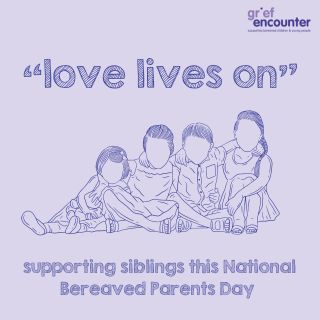On National Bereaved Parent’s Day, we recognise the profound impact of grief, and the importance of remembering special people who have died. At Grief Encounter, we support children and young people after the death of a sibling, but also offer holistic support to families as a unit to ensure children are supported the very best way they can be.
This year’s theme is “Love Lives On”. Research shows that keeping memories and bonds alive is a crucial part of the healing process, and reflecting on special memories can provide connection and comfort to some children and young people. Read our Useful Guide on supporting children and young people after the death of a sibling and how keeping memories alive can encourage hope and healing.
Sibling Grief
After the death of a sibling, children and young people often experience a wide range of emotions, including sadness, anger, confusion, and guilt. They may also feel isolated or overshadowed by the grief of their parents, not wanting to add to their parents’ grief or scared to make them more upset. Understanding these complex emotions is crucial in providing effective support for children.
The way children grieve can vary significantly based on their age and developmental stage. Tailoring support to meet these needs is essential, and at Grief Encounter, we work closely with the family unit to make sure children are getting the very best support for their unique needs. Open and honest communication is important, and siblings should be encouraged to express their feelings, and ask questions when they want to. Involving siblings in memorial activities can help them feel included and involved.
Some Ideas to help support grieving siblings
Create a Safe Space: Ensure that siblings have a safe and supportive environment to express their feelings. This can be through conversations, art, writing, or play.
Maintain Routines: Keeping to regular routines can provide a sense of normalcy and stability during a uniquely challenging time.
Age-Appropriate Conversations: Tailor conversations about death and grief to the child’s age and understanding. Use clear and simple language.
Encourage Memory Sharing: Help siblings keep the memory of their loved one alive by encouraging them to share stories, look at photos, or create memory books.
Involve Them in Rituals: Involve siblings in memorial services and rituals. Allow them to contribute in ways that feel meaningful to them, such as choosing a song, drawing a picture, or lighting a candle.
Seek Professional Support: Consider seeking professional support from a specialist charity such as Grief Encounter. Call 0808 802 0111 for more information.
Peer Support: Encourage connections with peers who have experienced similar losses. Peer support can provide a sense of understanding and reduce feelings of isolation.
Some useful activities for children and young people to remember
Memory Box: Create a memory box filled with items that remind the sibling of their loved one, such as photos, letters, or small mementos.
Art Projects: Encourage siblings to express their feelings through art projects, such as drawing, painting, or crafting.
Outdoor Walks: Take nature walks and use the time to talk about their loved one and share memories.
Mindfulness: Teach simple mindfulness exercises to help siblings manage their emotions and find moments of calm.
Supporting grieving siblings on National Bereaved Parents Day is an important part of their healing journey. By providing a safe space for expression, involving them in meaningful rituals, and offering ongoing support, siblings can navigate their grief and find a way to remember, so that “Love Lives On”.
For additional resources and support, please contact Grief Encounter on 0808 802 0111, weekdays 9.30am-3pm.

